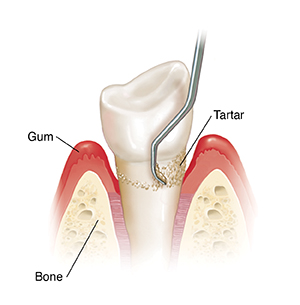What Is Scaling and Root Planing?
Scaling and root planing is a special type of deep cleaning done by a dental professional (general dentist, dental hygienist, or periodontist). This is a common treatment of gum disease. This cleaning removes plaque and tartar from beneath the gums and smooths the roots of your teeth. It helps restore health to your gums and teeth.
Your evaluation
Your dentist looks at your gums for color changes, bleeding, swelling, and recession. Your teeth are checked for looseness and sensitivity. Full mouth X-rays show if there is bone loss around your teeth.
The procedure
Scaling is when the dentist removes plaque and tartar from below your gum line. This controls the growth of harmful bacteria. Root planing is when the dentist smooths the roots of your teeth. This helps gums reattach firmly to the teeth. Because this procedure goes deeper than a regular cleaning, your mouth may be numbed. The cleaning may take one or more visits to complete with ongoing maintenance therapy to maintain healthy gums and teeth.
 |
| Scaling |
 |
| Root planing |
After your procedure
Your mouth may feel sore and tender for several days after treatment. And you may have some bleeding from your gums. Keep brushing and flossing your teeth after each meal. Your dentist may tell you to rinse with warm saltwater every few hours. Pain medicine may be suggested if you need it. Ask your dentist if you should use an antimicrobial rinse. A follow-up appointment will be scheduled to see how well your gums have healed.
Online Medical Reviewer:
Daphne Pierce-Smith RN MSN
Online Medical Reviewer:
Rita Sather RN
Date Last Reviewed:
5/1/2025
© 2000-2025 The StayWell Company, LLC. All rights reserved. This information is not intended as a substitute for professional medical care. Always follow your healthcare professional's instructions.